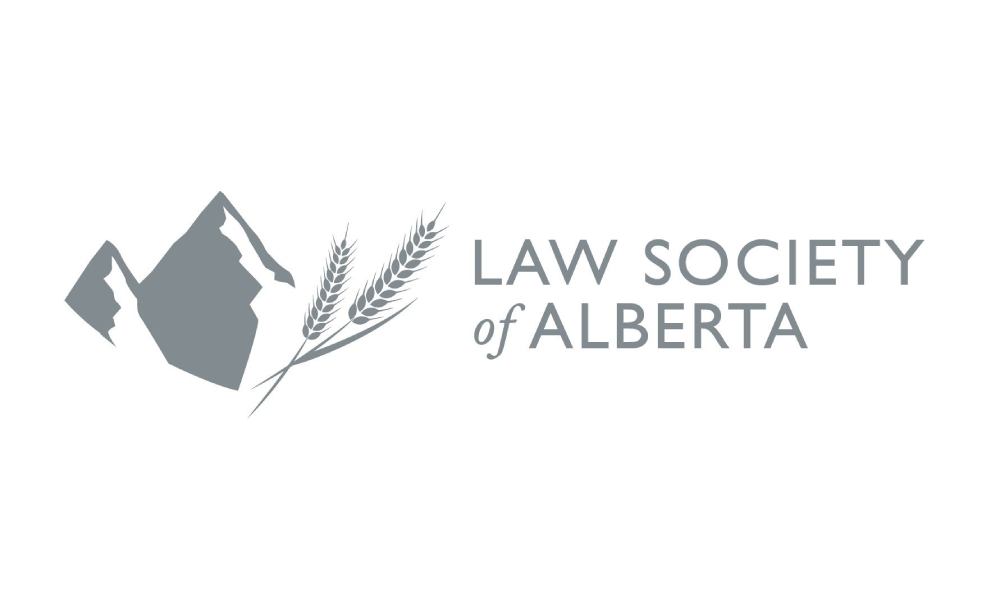Benchers approve acknowledgement of the impact of systemic discrimination, and a way forward

The Law Society of Alberta has acknowledged the existence and impact of systemic discrimination within the justice system, including within the provincial regulatory system and across the legal profession.
“The law society views its core purpose as an active obligation and duty to uphold and protect the public interest in the delivery of legal services,” the society said in a release earlier this week after benchers had voted to approve the acknowledgement. “We do this through our regulatory objectives, one of which is to promote equity, diversity and inclusion in the legal profession and in the delivery of legal services.”
Elizabeth Osler, QC, Chief Executive Officer and Executive Director of the society, said in an emailed response to questions that the acknowledgement is "just one step for the law society in fulfilling its mandate to protect the public interest by promoting and enforcing a high standard of professional and ethical conduct by Alberta lawyers." A key part of this is "supporting lawyers so they have a safe place to practice law and deliver quality legal services to the diverse population in Alberta." The ability to protect the public interest, she added, "is hindered if the legal profession does not reflect the population it serves."
In the fall of 2020, lawyers, articling students, law students and internationally trained lawyers were invited by the society to share any experiences related to racial discrimination and stereotyping.
“Those who bravely shared their stories were also a voice for some who could not speak,” said the society in the news release. “Each submission impacted our organization and the legal profession more broadly.”
The society added: “When we use the term systemic discrimination, we mean policies, procedures, and practices within systems and institutions that result in disproportionate opportunities or disadvantages for people with a common set of characteristics such as age, culture, disability, gender, race, religion, sexual orientation, and/or socioeconomic status.”
Discrimination within the legal profession happens due to “some of the inequitable principles historically embedded in our systems and institutions,” the society said, resulting in “disproportional harmful impacts to those who are marginalized.”
The society said it had made efforts to address the issues of “deep-rooted inequities.” Still, it also acknowledges that further steps to address systemic discrimination are needed.
Initiatives such as exit surveys between 2005 and 2010, the articling program assessment survey in 2019, and the “My Experience” project in 2020 and 2021 allowed the society to hear the voices of those in the legal profession “suffering from the disproportionate harmful impacts” of systemic discrimination.
“We recognize and accept the need to take further steps to address systemic discrimination” within the law society, the legal profession, and the justice system.
“Acknowledging that systemic discrimination exists within the law society, the legal profession and the justice system is a step towards improving how we protect the public interest and fulfill our regulatory objectives. Acknowledging the impact of systemic discrimination allows us to meaningfully continue the work of making the legal profession more equitable, increasing diversity, and promoting inclusion.”
The society added that as part of its commitment to take further steps to address systemic discrimination, it hopes to “lead by example.” It has already started down this road by “ensuring that our benchers participated in training focused on unconscious bias . . . in their governance and decision-making roles.” It has also mandated that lawyers complete the Indigenous Cultural Competency Education through The Path (Alberta).
“Where systemic discrimination manifests in policies, procedures and other work of the law society, we will identify this and address it.”
Osler said the society has been encouraged that, to date, about 2,400 lawyers have completed The Path program, with about another 1,300 currently enrolled. Of those lawyers who have taken the course so far, 93 percent have given it a rating of good, very good, or excellent. As well, 90 percent "strongly agreed or agreed that it increased their knowledge and understanding of Indigenous cultural awareness."
Most Alberta lawyers have until Oct. 20 of this year (18 months since it was launched) to complete The Path course or certify eligibility for an exemption.
The society added in its release that in 2022, everyone within the society, the Canadian Centre for Professional Legal Education (CPLED) and Alberta Lawyers Indemnity Association (ALIA), will also be expected to participate in similar training that will be tailored to incorporate department-specific material.
“We will continue to work on a variety of projects around gathering equity, diversity, and inclusion data, supporting vulnerable members of the profession, making our conduct proceedings more inclusive and collaborating with stakeholders to tackle systemic barriers to inclusion,” the society said.
“The law society remains committed to reducing barriers created by racism, bias and discrimination, in order to affect long-term systems changes within our legal culture,” said the society.
“We are committed to continuing our efforts to learn, to listen, to act, and to lead Alberta’s legal profession by example. In collaboration with the legal profession, stakeholders and justice system partners, the law society will continue to work diligently towards building a more diverse, equitable, and inclusive legal profession for all.”
Osler said the society would also "continue to work on a variety of projects around gathering equity, diversity and inclusion data, supporting vulnerable members of the profession, making conduct proceedings more inclusive and collaborating with stakeholders to tackle systemic barriers to inclusion and respond to the Truth and Reconciliation Commission’s Call for law societies.” It will also continue to offer complimentary workshops on discrete issues, such as cultural competence, to the profession.
Through ongoing “actionable” work in this area, the law society “will continue to lead a profession that is representative of the public it serves.”










